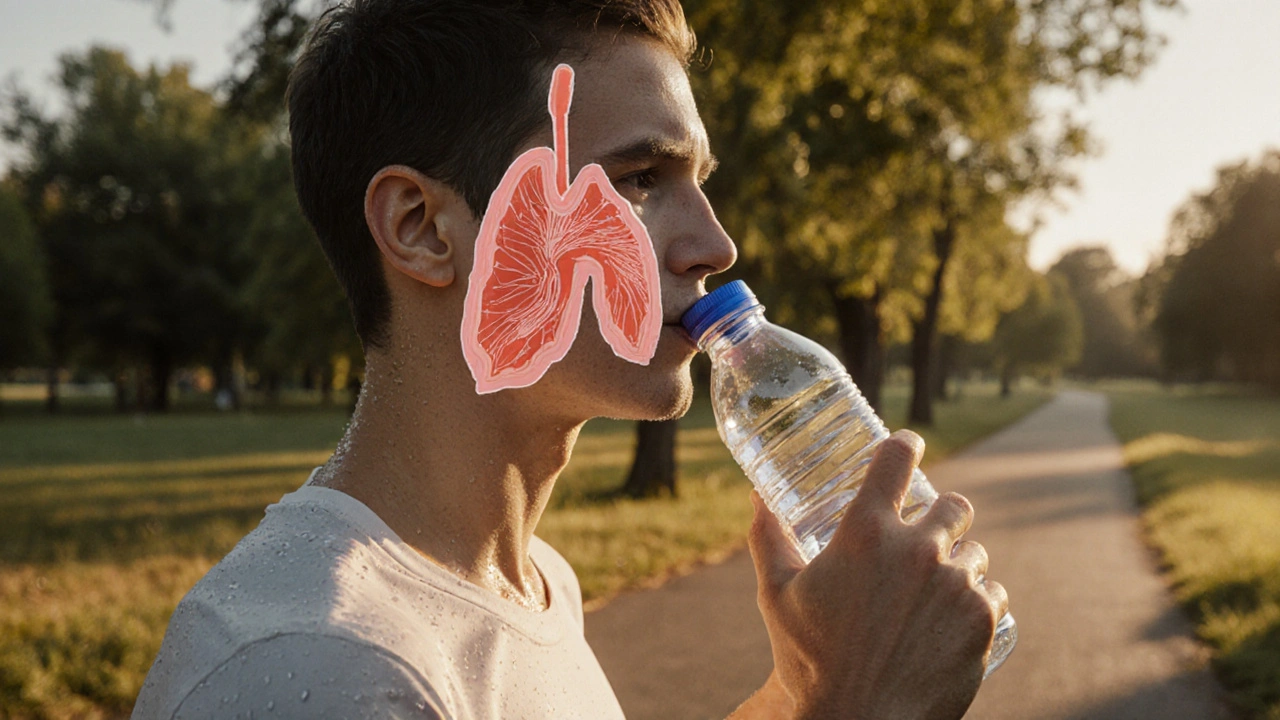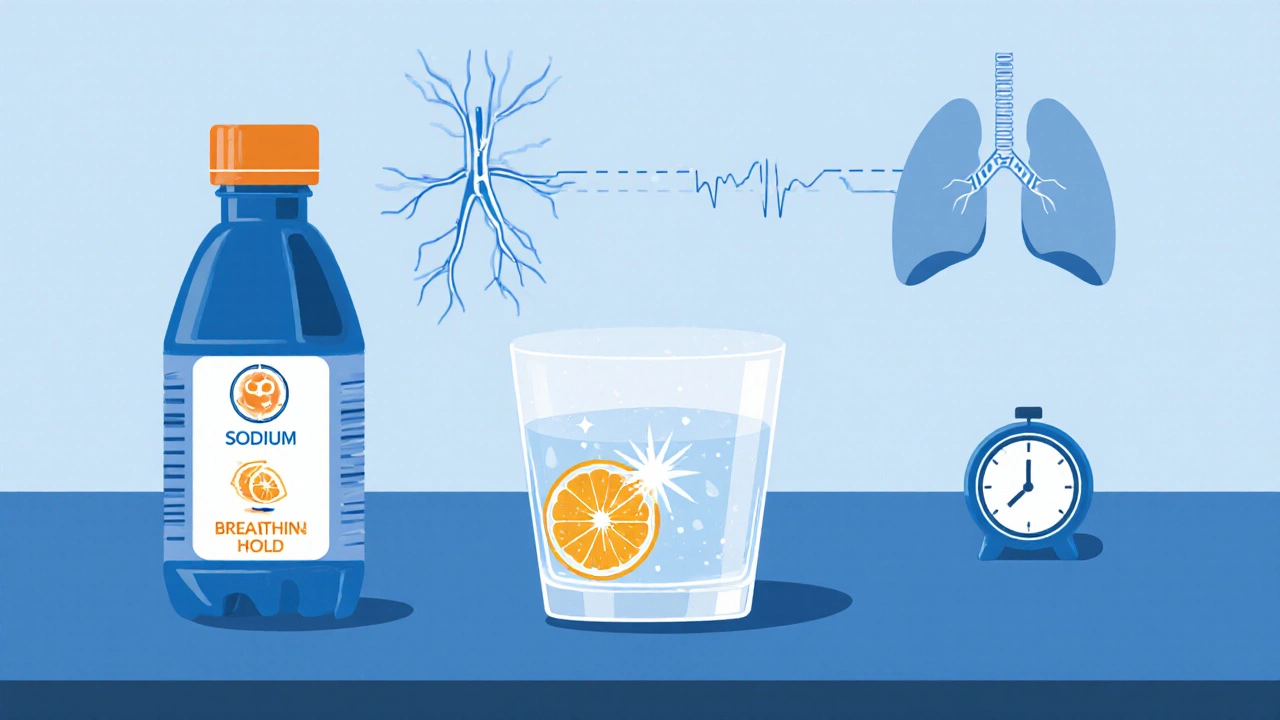Hiccups and Dehydration: Exploring the Link and What It Means for You
 Oct, 1 2025
Oct, 1 2025
Dehydration & Hiccups Risk Calculator
Enter your details and click "Calculate Your Risk" to see how dehydration might affect your likelihood of hiccups.
Ever get an annoying bout of hiccups after a marathon walk in the sun or a late‑night gaming session? You might wonder whether not drinking enough water is the culprit. The short answer is: dehydration can set the stage for hiccups, but it’s only one piece of a bigger puzzle. Below we unpack the science, share practical ways to keep the hiccups at bay, and show you when a glass of water might actually solve the problem.
Quick Take
- Dehydration can irritate the diaphragm and the nerves that control it, making hiccups more likely.
- Electrolyte imbalances, especially low sodium or potassium, amplify the risk.
- Rehydrating with water or an electrolyte drink often stops mild hiccups quickly.
- Persistent hiccups (>48hours) usually stem from other causes and need medical attention.
- Staying consistently hydrated, eating balanced meals, and avoiding rapid temperature changes are the best long‑term defenses.
What Exactly Are Hiccups?
Hiccups are involuntary contractions of the diaphragm, the muscle that separates the chest from the abdomen and drives breathing. Each contraction is followed by a sudden closure of the vocal cords, producing the characteristic "hic" sound. The medical term for a hiccup is singultus, and while a single episode is harmless, repeated bouts can be uncomfortable and socially awkward.
Understanding Dehydration
Dehydration is a state where the body loses more fluids than it takes in, leading to a deficit in total body water. Even a 2% loss can impair physiological functions, such as blood pressure regulation, temperature control, and nerve signaling. Common signs include thirst, dry mouth, dark urine, fatigue, and dizziness.
The Biological Bridge: How Low Fluid Levels Can Trigger Hiccups
Two key players connect dehydration to hiccups: the phrenic nerve and the vagus nerve. Both nerves innervate the diaphragm and the upper digestive tract. When you’re dehydrated, blood becomes more viscous, reducing oxygen delivery to nerve tissue. This slight hypoxia can make the nerves hyper‑excitable, prompting random diaphragm spasms.
Dehydration also skews electrolyte balance-especially sodium, potassium, and calcium. These minerals are essential for proper nerve impulse transmission. A deficit can cause erratic firing of the phrenic or vagus nerve, translating into hiccup episodes. In short, water loss + electrolyte shift = a perfect storm for that "hic".
When Is Dehydration the Likely Culprit?
Not every hiccup episode stems from low fluid levels. Look for these tell‑tale signs that dehydration is playing a role:
- You’ve been sweating heavily (exercise, hot weather, fever) and haven’t replenished fluids.
- You’ve consumed alcohol or caffeine without drinking water.
- Urine is dark yellow or you feel a persistent dry throat.
- The hiccups start shortly after a bout of activity where you felt thirsty.
If you tick several of these boxes, a quick sip of water or an electrolyte‑rich beverage is worth a try before reaching for home‑remedy tricks.

Hydration Strategies to Stop Hiccups Fast
- Drink a glass of room‑temperature water quickly. The rapid ingestion stretches the esophagus, which can reset the vagus nerve.
- If plain water feels bland, add a pinch of sea salt or a splash of orange juice to restore sodium and potassium.
- Try a sports drink that contains 20-30mmol/L of sodium and 5-10mmol/L of potassium. This combo aids nerve function and can quell hiccups within minutes.
- Hold your breath for 10-15 seconds, then sip water. The breath‑hold temporarily raises carbon dioxide levels, which also dampens nerve excitability.
- For chronic hiccups, aim for at least 2.7L (women) or 3.7L (men) of fluid per day, adjusting for activity level and climate.
These tactics work because they address two fronts: restoring fluid volume and stabilizing electrolytes, both of which calm the hyper‑responsive nerves.
Other Common Hiccup Triggers - How They Compare
| Trigger | Typical Mechanism | Linked to Dehydration? |
|---|---|---|
| Dehydration | Electrolyte imbalance + nerve hypoxia | Yes |
| Carbonated drinks | Rapid gastric distension irritates the vagus nerve | Indirect (bubbles can increase acid reflux) |
| Sudden temperature change (cold water then hot) | Thermal shock to esophageal lining | No |
| Spicy or acidic foods | Stimulation of gastric mucosa, reflux | Occasional (if it causes vomiting → fluid loss) |
| Emotional stress or excitement | Heightened vagal tone | No |
Seeing the table makes it clear that dehydration is unique in that it directly alters the chemical environment of the nerves. Other triggers mostly rely on mechanical or hormonal changes.
Long‑Term Prevention Tips
- Carry a reusable water bottle and sip regularly, not just when you’re thirsty.
- Include electrolyte‑rich foods like bananas, avocado, and leafy greens in your daily meals.
- Avoid excessive caffeine or alcohol without water compensation.
- Limit carbonated drinks, especially on an empty stomach.
- Practice mindful eating-chew slowly and avoid gulping air.
- Monitor urine color; aim for pale straw tone as a hydration benchmark.
When to Seek Medical Help
If hiccups linger beyond 48hours, are severe enough to disrupt sleep or eating, or are accompanied by chest pain, shortness of breath, or vomiting, it’s time to consult a healthcare professional. Persistent hiccups can signal neurological issues, gastrointestinal disorders, or medication side effects-conditions that require targeted treatment beyond hydration.
Frequently Asked Questions
Can drinking cold water make hiccups worse?
Cold water can sometimes trigger a reflex that tightens the diaphragm, especially if you swallow it too quickly. If you’re trying to stop hiccups, room‑temperature water is usually safer.
How much water should I drink to prevent hiccups?
Aim for the general daily recommendations-about 2.7L for women and 3.7L for men-adjusting upward for hot weather, exercise, or illness. Consistent sipping throughout the day is more effective than a single large glass.
Are electrolyte drinks better than plain water for hiccups?
If you suspect an electrolyte imbalance (e.g., after heavy sweating), a low‑sugar sports drink can restore sodium and potassium faster, which may calm the nerves more quickly than water alone.
What other health issues can dehydration cause besides hiccups?
Common effects include headache, reduced cognitive performance, kidney stones, constipation, and in severe cases, heatstroke or shock. Keeping hydrated supports virtually every organ system.
Is it safe to use over‑the‑counter hiccup medicines if I’m dehydrated?
Most OTC options contain antihistamines or muscle relaxants that can cause drowsiness and, in rare cases, dry mouth-potentially worsening dehydration. It’s better to try hydration first, and consult a pharmacist if you need medication.
Next Steps and Troubleshooting
If a single hiccup spell stops after a glass of water, great-keep up the habit. If they return, try an electrolyte boost or the breath‑hold technique. Record when hiccups happen: time of day, recent activity, food or drink intake. Patterns often reveal a hidden trigger, such as a post‑workout protein shake that’s low on sodium. Finally, keep a simple hydration log for a week; spotting a dip in fluid intake can be the clue you’ve been missing.


Anthony Burchell
October 1, 2025 AT 22:55If you think hiccups are just a nuisance, you’re missing the whole dehydration angle.
Michelle Thibodeau
October 4, 2025 AT 00:55Hiccups might seem trivial, but they can be a subtle signal from our bodies.
When we skimp on water, the diaphragm can become irritable, leading to those pesky contractions.
Think of your body as a garden; without enough water, even the strongest flowers wilt.
Staying hydrated nourishes every cell, including the nerves that control breathing.
In climates that are hot or humid, the need for fluids spikes dramatically.
Caffeine and alcohol, while socially delightful, act like sneaky thieves stealing moisture.
Imagine trying to dance on a dry floor-your steps become stiff and unpredictable.
Similarly, a dehydrated system can stumble, causing hiccups to pop up unexpectedly.
The calculator in the article cleverly quantifies these risk factors, giving you a personalized glimpse.
If your risk score lands high, consider sipping water before meals and during workouts.
Even a modest increase of half a liter per day can shift the balance toward comfort.
For those who love coffee, alternating with a glass of water can keep the hiccup monster at bay.
Athletes, especially in intense training, should monitor sweat loss and replace it promptly.
Travelers to tropical regions will notice a quicker onset of dehydration symptoms, hiccups included.
Parents can teach kids the habit of regular water breaks, preventing both thirst and hiccup attacks.
Overall, viewing hiccups through the lens of hydration transforms a quirky nuisance into a useful health cue.
Patrick Fithen
October 6, 2025 AT 02:55While we chase the numbers on the calculator remember the body speaks in whispers a dry throat may be the quiet prelude to a hiccup chorus.
Michael Leaño
October 8, 2025 AT 04:55That’s a beautiful way to put it! Keeping a water bottle handy can turn those whispers into a smooth melody.
Jagdish Kumar
October 10, 2025 AT 06:55Ah, the melodrama of dismissing hiccups! One must appreciate that even the most trivial convulsion may betray a deeper physiological dissonance, a testament to the body’s eloquent cry for equilibrium.
Aminat OT
October 12, 2025 AT 08:55lol u r right but i alwz just chug soda lol its gud
Amanda Turnbo
October 14, 2025 AT 10:55Honestly, most of these “risk calculators” are just clever marketing fluff; if you’re truly hydrated, you won’t waste time worrying about occasional hiccups.
Jenn Zuccolo
October 16, 2025 AT 12:55While I respect your skepticism, one could argue that quantifying physiological phenomena bridges the gap between anecdote and empirical understanding, thereby enriching our collective knowledge.
Courtney The Explorer
October 18, 2025 AT 14:55Look-our bodies are engineered, period. When dehydration hits, the neural feedback loop destabilizes-resulting in involuntary diaphragmatic contractions; it’s a simple bio‑mechanical cascade.
Ashleigh Connell
October 20, 2025 AT 16:55I appreciate the philosophical angle; staying hydrated is a low‑effort habit that yields high‑impact returns for anyone, regardless of background.
Erin Knight
October 22, 2025 AT 18:55Reading the code behind the calculator, I noticed the risk algorithm oversimplifies complex metabolic pathways, reducing nuanced hydration dynamics to arbitrary point values.
Kavita Jadhav
October 24, 2025 AT 20:55Your observation is spot‑on; nevertheless, simplifying variables can still provide actionable insights for the average person seeking to avoid hiccup episodes.
Tony Halstead
October 26, 2025 AT 21:55Indeed, while precision is ideal, the educational value of such tools lies in raising awareness that water intake influences even the most unexpected bodily functions.
leo dwi putra
October 28, 2025 AT 23:55True, but let’s not forget that cultural habits around beverage consumption also shape hydration status, so any model should account for regional preferences.
Krista Evans
October 31, 2025 AT 01:55Hey folks, just a quick tip: when you feel a hiccup coming on, sip a glass of water slowly-sometimes the simple act of swallowing interrupts the spasm.
Mike Gilmer2
November 2, 2025 AT 03:55That’s classic home‑remedy wisdom, yet I’d add that a brief breath‑hold followed by a gulp can amplify the reset effect on the diaphragm.
Alexia Rozendo
November 4, 2025 AT 05:55Oh great, another “life hack” that everybody’s already tried. Thanks for the revelation.
Suresh Pothuri
November 6, 2025 AT 07:55While I admire the brevity, scientific literature suggests that controlled breathing techniques, combined with hydration, reduce hiccup duration more effectively than either method alone.
Millsaps Mcquiston
November 8, 2025 AT 09:55Good point. Simple steps work best.